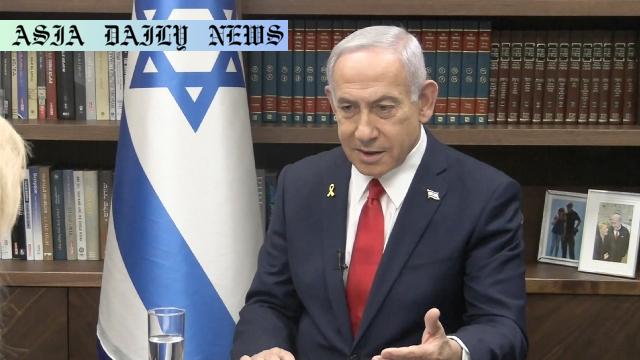Netanyahu: Israeli Prime Minister declares Israel’s capability to target all Iranian nuclear facilities without US assistance.

Netanyahu’s Declarative Statement on Israel’s Self-Reliance
Israeli Prime Minister Benjamin Netanyahu has made a bold assertion that his nation possesses the capability to eliminate Iran’s nuclear sites without relying on assistance from the United States. Speaking to an Israeli TV station on Thursday, Netanyahu confidently stated, “We have the power to remove all our targets, all their nuclear facilities.” The Israeli leader’s remarks underscore a broader intent to remain strategically prepared, highlighting Israel’s commitment to counter perceived threats regardless of external partnerships.
Iran’s Fordow uranium enrichment facility, reportedly situated 80 meters underground in a mountainous region of central Iran, has been identified as a critical and deeply fortified site. The Fordow complex has historically been a focal point of contention between Iran and the global community, further fueling geopolitical tensions. Netanyahu’s comments suggest that even heavily fortified and deeply buried facilities such as Fordow would not be exempt from Israeli military capability.
Potential US Involvement and Military Considerations
While Netanyahu emphasized independence, the possibility of US involvement remains on the table. Reports indicate that the United States, during Donald Trump’s administration, is considering military intervention at Israel’s request. This could include the deployment of advanced “bunker-buster” bombs capable of penetrating deeply fortified facilities like Fordow.
The US-based news outlet Axios reported via Israeli sources that Israel holds the capacity to inflict significant damage to the Fordow complex independently. These sources also referenced Israel’s prior experience targeting underground sites, such as a missile factory in Syria last September. Such efforts reflect Israel’s prowess in advanced military technology and precision strike capabilities, even against challenging targets.
Implications of Netanyahu’s Stance
Netanyahu’s remarks carry substantial implications for both regional stability and the broader international political landscape. By publicly declaring readiness to act unilaterally, Netanyahu reinforces Israel’s stance against Iran’s nuclear ambitions, signaling a willingness to take preventative measures without reliance on foreign powers like the US.
However, such assertions could provoke heightened tensions in an already volatile region. Iran may perceive this as a direct threat, potentially prompting a response that could cascade into broader conflict. The international community, meanwhile, may interpret Netanyahu’s statement as a call to reevaluate its approach to Iranian nuclear issues and ensure a diplomatic resolution remains possible amidst rising tensions.
The Challenges Ahead
While Netanyahu’s confidence is notable, executing attacks on deeply buried or fortified nuclear facilities like Fordow poses significant logistical and strategic challenges. The assertion of self-reliance underlines Israel’s advanced technology and military preparedness but also highlights the potential risks involved. Complex military operations require planning, intelligence, and precision, with success dictated by factors ranging from environmental complexities to potential retaliation from Iran.
Moreover, strategic decisions concerning military interventions often carry long-term consequences. The potential for escalation and civilian fallout complicates such initiatives, making it imperative for Israel’s leadership to weigh short-term gains against long-term regional stability.
Conclusion: Navigating a Delicate Balance
Netanyahu’s statement emphasizes Israel’s resolve to safeguard its security interests against perceived threats from Iran. However, such declarations also underline the precarious balance of deterrence and potential conflict in the region.
Moving forward, the importance of engaging allies, fostering diplomatic solutions, and maintaining vigilance against escalatory actions will be critical. As tensions persist, the global community will undoubtedly keep a close watch on how Netanyahu’s bold declarations translate into action—or strategic restraint.
Commentary
Analyzing Netanyahu’s Bold Stance
Israeli Prime Minister Benjamin Netanyahu’s insistence on Israel’s capability to act independently against Iran’s nuclear facilities serves as a strong statement of national strength and resilience. It reflects Israel’s longstanding doctrine of self-defense, which has defined its geopolitical strategy for decades. By underpinning this confidence with examples like the strike on a Syrian underground missile factory, Netanyahu reinforces the perception that Israel can act decisively when national security is under threat.
Shaping Regional Dynamics
Netanyahu’s statement undeniably has ripple effects on regional dynamics. It sends a clear message not only to Iran but also to neighboring countries and opponents in the Middle East. Israel’s focus on preserving its advantage in military technology and intelligence amplifies its position as a formidable regional actor. However, such declarations also risk heightening security concerns and stepping up an already intense arms race in the Middle East—a situation that demands cohesive international diplomacy to neutralize potential flashpoints.
Weighing Diplomacy Over Hostility
While Israel has every right to protect its sovereignty, Netanyahu’s approach also renews the call for balanced solutions through diplomacy. The possibility of unilateral action—which carries high risks—can escalate tensions in the region, detracting from efforts to ensure peace and stability. Balancing military readiness with meaningful dialogue would serve all stakeholders and potentially avert unintended consequences.
Final Thoughts
Netanyahu’s declarations highlight Israel’s strategic emphasis on preventing perceived nuclear threats while also serving as a political statement of self-reliance. Whether this translates to action or remains a deterrent will ultimately depend on Israel’s wider calculations and the international response to evolving tensions in the Middle East.


